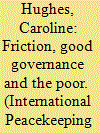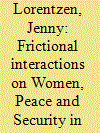|
|
|
Sort Order |
|
|
|
Items / Page
|
|
|
|
|
|
|
| Srl | Item |
| 1 |
ID:
151657


|
|
|
|
|
| Summary/Abstract |
Most studies on diversity in Southeast Asia focus on the nation-state, with much less attention given to everyday encounters and the negotiation of diversity in local contexts. This article investigates the discourses and practices of various actors in the historically tolerant, generally peaceful, and diverse city and special region of Yogyakarta, Indonesia. This study examines this ethnic, religious and cultural diversity and illustrates the negotiations among various interest groups and actors that strive to maintain this balance, or sometimes to strategically disrupt it. As such, the findings offer a different way to understand and interrogate the challenges confronting present-day diversity both on a local level in Yogyakarta, and also for Indonesia and Southeast Asia at large.
|
|
|
|
|
|
|
|
|
|
|
|
|
|
|
|
| 2 |
ID:
123991


|
|
|
|
|
| Publication |
2013.
|
| Summary/Abstract |
Friction is a zone of contingency where creative responses of local and international agents produce unexpected effects. Viewing 'good governance' in this light allows better appreciation of the blurring of boundaries between international prescriptions and local cultures, often regarded as antithetical in the Cambodian case. In fact, actors in Cambodia mobilize both a newly invigorated domestic cultural discourse and international ways of working to pursue struggles over development in the post-conflict context. However, elite actors are much better placed to do this successfully than are the poor.
|
|
|
|
|
|
|
|
|
|
|
|
|
|
|
|
| 3 |
ID:
181833


|
|
|
|
|
| Summary/Abstract |
More than 20 years after the adoption of UN Security Council Resolution 1325 on Women, Peace and Security, the international community is concerned with taking stock of its implementation in countries undergoing transitions from war to peace. This article contributes to a better understanding of the dynamics involved in implementing the Women, Peace and Security agenda through a focus on the frictional interactions that take place between different actors promoting women's participation in the peace process in Mali. Based on extensive fieldwork in Bamako between 2017 and 2019, it analyses interactions between different international and local actors in the Malian peace process through a discussion of vertical (between international and local actors) and horizontal (between local actors) friction. It finds that the way different actors respond to friction shapes relationships and impacts norm trajectories by triggering feedback loops, which in turn trigger new responses and outcomes.
|
|
|
|
|
|
|
|
|
|
|
|
|
|
|
|
| 4 |
ID:
089295


|
|
|
| 5 |
ID:
147687


|
|
|
|
|
| Summary/Abstract |
Peacebuilding attempts invoke a considerable amount of friction. In this article we argue that these frictional encounters can be made visible by focusing on articulations of resistance voiced by different actors in the intervention scene, including national elites and interveners. Departing from the discussion of the regionally led facilitation in Burundi, we show that the respective national elites and African interveners referred to different scales in order to legitimise their resistance: the Great Lakes Peace Initiative for Burundi resisted sedimented continental practices as well as international attempts to impose their conceptions of peace, whereas the Burundian elites repeatedly rejected regionally sponsored ‘solutions’ with reference to the domestic situation. Drawing on interviews with and statements by diverse national and regional forces, we show how claims to resist were articulated with respect to different spatial reference points and thereby explore how regional and domestic actors talked past each other.
|
|
|
|
|
|
|
|
|
|
|
|
|
|
|
|
| 6 |
ID:
192942


|
|
|
|
|
| Summary/Abstract |
In Vietnam's capital city Hanoi, the growing popularity of application based (app-based) motorbike taxis has offered many inhabitants new opportunities to pursue a mobile livelihood with ride-hailing platforms. Nonetheless, as this influx of app-based drivers has hit the city's streets, specific livelihood and mobility frictions have emerged, notably with informal, ‘traditional’ motorbike taxi drivers, or xe ôm. In this paper we analyse these evolving sites and moments of friction and their impacts on driver livelihoods and mobilities for both driver groups. We draw conceptually on debates regarding mobility, platform economies, and urban livelihoods, while specifically interrogating the concept of friction to highlight three possible analytical applications. Methodologically, we interpret static and ride-along interviews completed with over 130 drivers. We highlight a range of tactics ‘traditional’ and app-based motorbike taxi drivers have employed to respond to rising frictions, defend their ‘turf’, and maintain their street-based livelihoods. Driver responses reveal differing access to distinctive forms of social capital and social networks, and contrasting levels of agency regarding their mobilities. By conceptually teasing apart the notion of friction, we wish to expand and deepen understandings of the experiences of vulnerability, precarity, and other impacts of platformisation for different motorbike taxi driver cohorts.
|
|
|
|
|
|
|
|
|
|
|
|
|
|
|
|
|
|
|
|
|